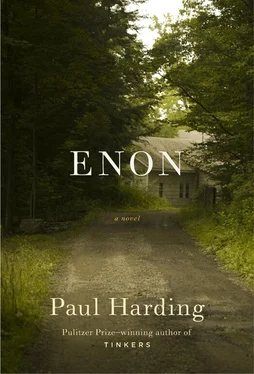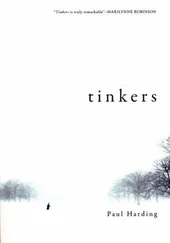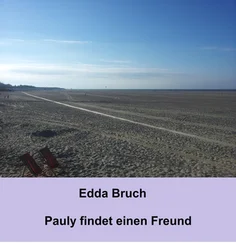Paul Harding - Enon
Здесь есть возможность читать онлайн «Paul Harding - Enon» весь текст электронной книги совершенно бесплатно (целиком полную версию без сокращений). В некоторых случаях можно слушать аудио, скачать через торрент в формате fb2 и присутствует краткое содержание. Жанр: Современная проза, на английском языке. Описание произведения, (предисловие) а так же отзывы посетителей доступны на портале библиотеки ЛибКат.
- Название:Enon
- Автор:
- Жанр:
- Год:неизвестен
- ISBN:нет данных
- Рейтинг книги:3 / 5. Голосов: 1
-
Избранное:Добавить в избранное
- Отзывы:
-
Ваша оценка:
- 60
- 1
- 2
- 3
- 4
- 5
Enon: краткое содержание, описание и аннотация
Предлагаем к чтению аннотацию, описание, краткое содержание или предисловие (зависит от того, что написал сам автор книги «Enon»). Если вы не нашли необходимую информацию о книге — напишите в комментариях, мы постараемся отыскать её.
Powerful, brilliantly written, and deeply moving Paul Harding has, in Enon, written a worthy successor to Tinkers, a debut which John Freeman on NPR called "a masterpiece." Drawn always to the rich landscape of his character's inner lives, here, through the first person narrative of Charlie Crosby (grandson to George Crosby of Tinkers), Harding creates a devastating portrait of a father trying desperately to come to terms with family loss.
Enon — читать онлайн бесплатно полную книгу (весь текст) целиком
Ниже представлен текст книги, разбитый по страницам. Система сохранения места последней прочитанной страницы, позволяет с удобством читать онлайн бесплатно книгу «Enon», без необходимости каждый раз заново искать на чём Вы остановились. Поставьте закладку, и сможете в любой момент перейти на страницу, на которой закончили чтение.
Интервал:
Закладка:
I heard Kate skitter back to the staircase and pad up to the third or fourth stair and turn around and thump back down, as if she were just coming down from the second floor. She came out of the dark hall into the doorway of the living room.
“You okay, Late Kate?”
“Fine, Dad. Just peeing. It’s roasting . The game’s still on?”
“Seven teenth inning,” I said.
“Did the power go out? My clock’s blinking. What time is it?”
“After four.”
Kate went to the bathroom and I stepped out to the back porch and lit a cigarette. I took a drag or two, but when I saw Kate coming out I tapped the ash off the end and palmed it.
“Perfect way to ruin a beautiful summer night,” I said as Kate stepped outside.
“It’s okay, Dad. I don’t care if you smoke.” She’d told me once that my smoking made her worry about me getting cancer or having a heart attack, but that there was also something comforting about it to her as well. She was used to the smell, she said.
I said, “But I care if you smoke.”
Kate looked up and said, “Wow — look at all the stars.”
The night sky was saturated with oceans of stars, with the maples and beeches in the yard making inky black continents among them. The clouds of the Milky Way were visible behind the stars.
“Weird to be lying on a couch watching a game called baseball on a thing called a television set, of all things, with all that out there,” I said.
“Hey,” Kate said. “There’re no crickets.”
I cocked my head and listened and, after a few seconds said, “That is strange. Really strange.”
“Too hot, maybe?”
“I really haven’t got the slightest idea. But it makes the night extra spooky.”
We stood for a moment, watching, then Kate said, “Dad, when you came downstairs, did you stop and look at me sleeping?” I turned to her and arched my eyebrows.
“I plead the Fifth,” I said.
“I don’t care — just wondering.” She stared at her feet and raised one off the ground and pointed her toes and made a little figure eight with them in the air, like a dance exercise.
“Well, I don’t need this stinky thing,” I said, and stubbed out the cigarette on the driveway and flicked the butt into the planting pot I kept tucked against the corner of the house for spent smokes. “Let’s go see about them Sox.”
We returned to the living room. I dropped myself down on the middle of the couch, rested the orange juice on my stomach, and flung an arm behind my head. Kate sat on the edge of the end of the couch nearest the doorway to the dining room. I waggled my fingers and Kate leaned over and took my hand in hers and kissed it.
“My dad, the vampire,” she said.
“Some vampire, lying on the couch watching baseball,” I said back.
“How long’s this thing going to go?”
“I don’t know. Maybe forever at this point. The game that never ended ,” I said, in a silly, sinister voice.
“They could make a special channel for it on TV.”
“Nah, well, this guy who’s pitching is a bench player. Someone’s going to knock a cream puff down the right field line and end it any second.”
“A cream puff right down Pastry Alley.”
“Exactly.”
Kate gave me a last, hammy smooch on the back of my hand, like in the cartoons, where the rabbit gives the hunter who’s stalking him a long, wet Mmmmmwah! before he yanks the hunter’s cap over his eyes and dives back down the rabbit hole.
“Night, Dad.”
“Night, Kates.”
Kate hiked back up to her room. I watched the game for another quarter hour and fell back asleep and again took up my dream, which had switched location from the house to a vast, curved aluminum frame, like a zeppelin’s, suspended in the clouds, along which I crawled, terrified. As I slept, the Red Sox finally beat the Mariners, and an hour later the sun rose over the last day of my daughter’s life.
15
I PLACED A SMALL BOUQUET OF BLUETS AND BUTTERCUPS ON Kate’s stone on the first anniversary of her death. I placed a spray of chicory and hawkweed that I saved from the summer on her stone, on what would have been her fourteenth birthday. The stone is a dark gray, flecked with chips of what look like quartz or mica. It is next to my mother’s and my grandparents’ stones. I sometimes imagine a quiet, clean, hidden bower for Kate, with little ornaments made from twigs and leaves and elaborate mobiles made of branches and cordgrass and even handmade bird feeders tucked into hollows, which I’d keep filled with black oil sunflower seeds, and evenly balanced and weighted by pebbles wound in twine and suspended from the corners, and slim glass flutes wound into the twine, in which I’d put droppers full of sugar water, so that there would be a watchful aviary above my girl, attended by birds whose ancestors were the ones Kate and I used to feed from our hands in the sanctuary.
I sold our house after I repaired the damage I had done to it and cleaned the yard. I sent Susan half of the money and put the rest in a savings account. I rented two rooms at the back of a large house half a mile from the center of Enon, from an elderly widow named Trowt. I received her permission to paint the rooms white (they were an antique salmon color when I first moved in). One room is my bedroom. I have a twin bed and a nightstand with a lamp on it. I keep my clothes in the closet, either hanging from hangers or in one of two inexpensive plastic three-drawer storage containers that have transparent fronts. The other room has a small electric stove, refrigerator, and sink along one wall. There is a high table with a butcher-block top in front of the appliances and sink, where I prepare my meals. Without any conscious decision, I have stopped eating meat. Most of my meals consist of rice and vegetables, which I chop with a dull old chef’s knife that has a magnet stuck to its handle that I found on the side of the refrigerator when I moved into the apartment. There is a narrow chair in one corner of the room, and a small table, on which sits a goosenecked lamp and a putty-colored rotary telephone. In the remaining corner of the room there is a large wingback Queen Anne chair that Mrs. Trowt gave me after checking in on me a week after I moved in and finding the apartment so spare. The chair is upholstered in fabric that has sun-faded poppies on an ivory background. The arms are slick and threadbare and stained with loops and dashes of ink that has browned with age. There is a standing brass lamp with a gold shade next to the chair that Mrs. Trowt also gave me.
I no longer drink bitter potions, or whiskey. I own an old green-and-blue pickup truck that I bought for twenty-five hundred dollars from a retired landscaper I knew years ago. I use it to transport a used ride-on lawn mower and a weed trimmer and a rake and a big broom and a shovel. I tend fourteen lawns in Enon. The truck breaks down regularly and I am happy to work on it during the weekends with some of my grandfather’s old tools, which I keep in a large plastic gray toolbox just inside the door to my rooms. My hand still hurts at the end of most every day and I take aspirin before I cook dinner every night.
I still smoke a cigarette with the pot of coffee I drink early every morning, and another after dinner. My rooms give out onto a circular courtyard formed by the turnaround of the gravel driveway. There is a barn opposite my rooms. It has a large door that slides open and shut on an iron roller. I open the barn door and sit just outside the opening on an old iron garden chair painted white that has blisters of rust erupting all over it. I am comforted by the feeling of the large dim open looming interior of the barn behind me. I smoke my cigarette in the morning and watch the light unroll across the yard and illuminate the gardens. I smoke my cigarette at the end of the day and I watch the evening advance and the light retreat and the gardens fold back up into shadow. When it’s hot I sometimes pull the chair just behind the threshold of the barn door so I can sit in the shade. The barn timber smells sweet. There’s a trace, too, of the hay once stored there. The big interior of the barn mutes the hissing of summer. When it’s cold I sometimes pull the chair just inside the barn so I can sit out of the wind or the snow. In the cold, the barn smells like the iron nails that hold it together and the iron pulleys above the loft. I sit in the chair and smoke and look at the light and the colors and think about things like trying to paint the same view in different seasons and how I could never translate the colors I see into paint, or how I don’t know what colors I’m actually looking at. I am a connoisseur of the day. Sometimes I sit in tears. Sometimes I sit in a wordless, inexplicable kind of brokenhearted joy.
Читать дальшеИнтервал:
Закладка:
Похожие книги на «Enon»
Представляем Вашему вниманию похожие книги на «Enon» списком для выбора. Мы отобрали схожую по названию и смыслу литературу в надежде предоставить читателям больше вариантов отыскать новые, интересные, ещё непрочитанные произведения.
Обсуждение, отзывы о книге «Enon» и просто собственные мнения читателей. Оставьте ваши комментарии, напишите, что Вы думаете о произведении, его смысле или главных героях. Укажите что конкретно понравилось, а что нет, и почему Вы так считаете.












